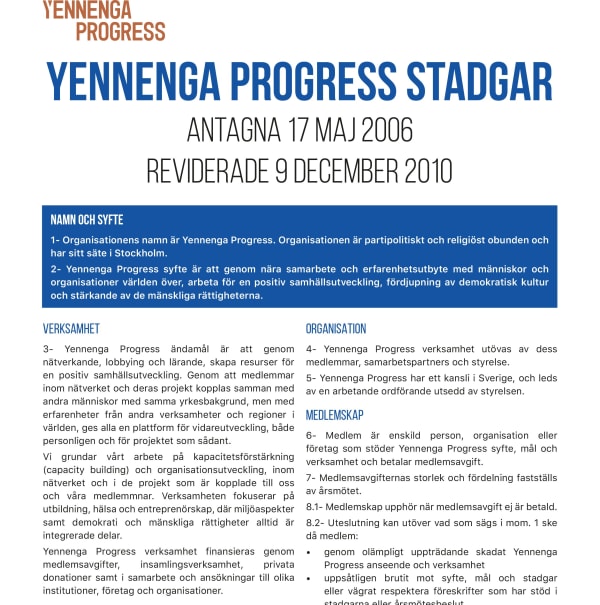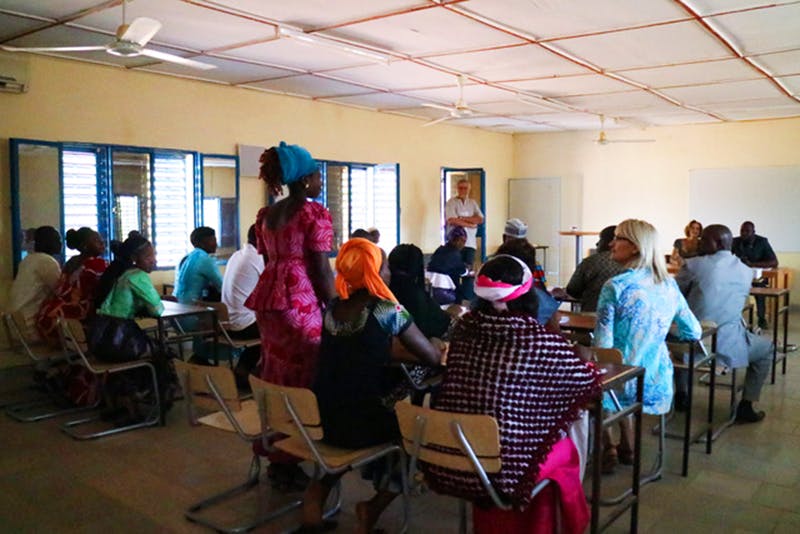
Stadgarna
Du kan ladda ner Yennengas stadgar på svenska genom att klicka här.

Yennenga Progress is registered as an organization in Sweden and in Burkina Faso.
The head office is located in Stockholm. Burkina Faso has a local office that initiates and manages the practical activities. The village of Nakamtenga is the “showroom” for The good village-concept. Instead of being separate projects, the activities there are part of life in the village. Therefore, we need to see the development of the activities as a process in an ever-changing society.
The activities in the village are supported and strengthened by the organization’s work in Sweden. In Sweden, the mission is to develop the organization’s network, ensure that the organization’s overall expertise is best used, create modern and gender-equal development cooperation strategies, and work with finances and communication.
The work of Yennenga Progress is based on the 17 UN sustainable development goals. We develop our organization based on the following targets:
In Burkina Faso, it is the Burkinabe organization that is the legal person and handles all rights and obligations of employees, ownership and contracts there. In Sweden, it is the Swedish organization that is the legal person and has the corresponding rights and obligations.
Yennenga Progress has two boards - one in Sweden and one in Burkina Faso. The role of the board members, both in Sweden and in Burkina Faso, is to contribute with their expertise and experience so that Yennenga Progress continues to be developed. The mission is to create the framework and organization best suited for realizing Yennenga Progress’ vision and The good village-concept.
The Swedish board members use their networks to recruit new expertise and business cooperation as well as for fundraising.
The mission of the Burkinabe board members includes coordinating the practical side of the projects so that development happens in a holistic way with the goal of creating a welfare society in mini-format.
The Swedish board is chaired by Cecilia Willians and the Burkinabe board is chaired by Lennart Karlsson.
Cecilia Williams Ehrenborg
Frida Monsen
Amanda Mompalao De Piro
Dan Lindgren
Jakob Trollbäck
Mia Barkland
Kent Sangler
Finn Norgren
Stina Berge
Lennart Karlsson
Joseph Ilboudo
Pauline Conde
Bernard Compaore
Sotissi Compaore
Joseph Ouedraogo
Pouswinde Yameogo
Leocadi Soalla
Adama Ilboudo
Parmoussa Sawado
Maria Boinrima Tiendrebeogo
Adolph Ilboudo
Fanny Sachs
Marianne von Der Esch
Stefan Einhorn
Marika Griehsel
Regina Sipos
Mats Hallvarsson
Anna Lallerstedt
Meg Tiveus
The expert network consists of companies and private persons that offer their expertise to projects on a voluntary basis. They may also participate in an exchange with our local teams. The expert network has so far mostly taken shape in Sweden. However, we do have volunteers both in Burkina Faso and in other countries.
The two advisory boards have slightly different structures and tasks in order to best connect with the culture and society they are active in.
In Sweden, the advisory board has a philosophical and ideological focus. The members are visionary, well-known people engaged on a voluntary basis, tasked with publicly projecting a vision of the future and Yennenga Progress’ role in society. They are the face of our organization and our ambassadors.
The Swedish advisory board of Yennenga Progress consists of:
In Burkina Faso, we have the village development council, which has a traditional structure with representatives of the seven neighborhoods of the village Nakamtenga. This group discusses a vision for the future and the roll of Yennenga Progress in society, but also addresses matters of strategic importance and the needs of the village. The village development council works out solutions to practical matters, conflicts and ethical positions.